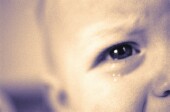 |
 |
 |
||
    |
||||
|
||||

Eye Problems, Hearing Loss May Be Linked
One gene mutation accounts for bulk of cases, study finds|
|
HealthDay
By Robert Preidt
Tuesday, February 17, 2009
 TUESDAY, Feb. 17 (HealthDay News) -- About 20 percent of children with sensorineural hearing loss also have eye disorders, a new study has found.
TUESDAY, Feb. 17 (HealthDay News) -- About 20 percent of children with sensorineural hearing loss also have eye disorders, a new study has found.
Sensorineural hearing loss, caused by damage to the inner ear or to the nerves that link the ear to the brain, affects up to three of every 1,000 children, according to background information in the study. Half of all cases in children are due to genetics, and one gene, GJB2, accounts for a large proportion of sensorineural hearing loss in whites.
For the study, Dr. Arun Sharma, of the University of Washington, Seattle, and colleagues reviewed data on 226 children with sensorineural hearing loss. Of that group, 49 (21.7 percent) had eye disorders, including 23 (10.2 percent) with refractive errors such as nearsightedness, farsightedness and astigmatism, and 29 (12.8 percent) with non-refractive errors. The researchers also found that the cause of sensorineural hearing loss was syndromic -- meaning it was associated with other symptoms -- in 11 children (4.9 percent), and five (2.2 percent) had syndromes with related eye problems.
All of the children were offered genetic testing for mutations in the GJB2 gene. Of the 144 who had the screening, 27 (18.8 percent) had two mutated copies of the GJB2 gene, and one of the 27 (3.7 percent) had an eye disorder. No eye problems were found in the 11 children with a single mutated copy, but there were eye problems in 22 (20.8 percent) of the 106 children with no mutations.
"This is consistent with the impression that GJB2 mutations result in sensorineural hearing loss but not in additional anomalies or syndromes," the researchers wrote.
"A multidisciplinary approach is important in the evaluation and treatment of children with sensorineural hearing loss to ensure that their medical, education and social needs are met," the study concluded. "Ophthalmologic evaluation can be beneficial for patients by allowing ophthalmologists to diagnose (and possibly treat) co-existing disorders that affect vision and by helping otolaryngology to determine cause of sensorineural hearing loss."
The study was published in the February issue of the journal Archives of Otolaryngology -- Head & Neck Surgery.
HealthDay
Copyright (c) 2009 ScoutNews, LLC. All rights reserved.
Related News:
- More News on Genetic Disorders
- More News on Hearing Problems in Children
- More News on Refractive Errors
More News on this Date
Related MedlinePlus Pages:
| Home | Health Topics | Drugs & Supplements | Encyclopedia | Dictionary | News | Directories | Other Resources | |
| Disclaimers | Copyright | Privacy | Accessibility | Quality Guidelines U.S. National Library of Medicine, 8600 Rockville Pike, Bethesda, MD 20894 National Institutes of Health | Department of Health & Human Services |
Date last updated: 18 February 2009 |
